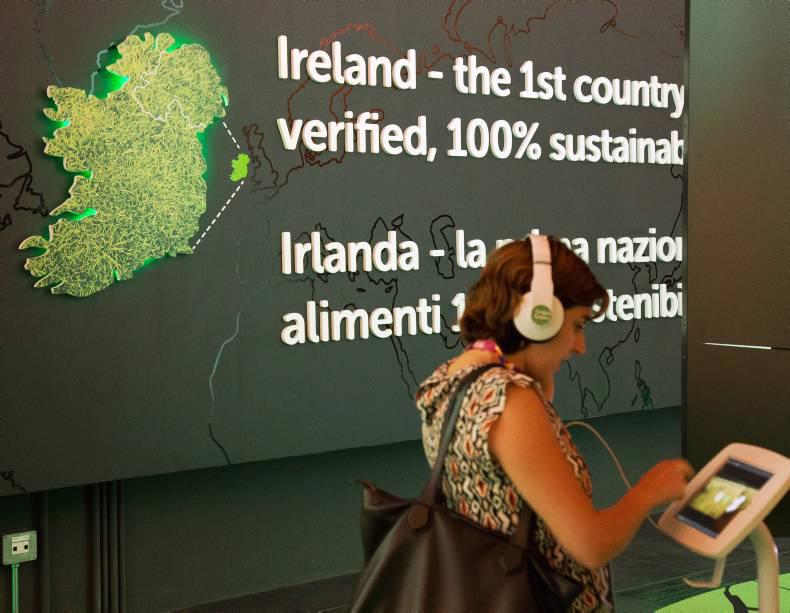Bord Bia released its 2015 Origin Green sustainability report on Monday, with data emerging from the first three years of the programme’s efforts to back up Ireland’s environmentally-friendly image on global food markets.
“Bord Bia insists that it is no longer sufficient for Ireland to simply declare that we are green. In a world facing challenges from climate change and resource scarcity, we must prove it as well,” the state’s food marketing agency said in a statement.
Findings from the participation of 90,000 farmers in carbon footprinting audits as part of Origin Green show that improving the practices of those farmers who are less carbon-efficient holds significant potential in tackling greenhouse gas emissions from Irish agriculture.
“Bringing beef and dairy farms currently running behind up to the average would potentially reduce emissions by almost 1mt CO2 equivalent annually. This equates to 6% of total emissions from agriculture,” Bord Bia calculated.
At the moment, the average carbon footprint across Origin Green beef farms is 12kg equivalent CO2 per kg of beef liveweight produced. Yet some farms achieve results as low as 5kg, while others emit 25kg of greenhouse gas.
For dairy farms the average carbon footprint is 1.18kg per kg of milk solids. With the average much lower than beef farms, the range of difference between the levels of emissions from dairy farms is also much narrower, ranging from 0.8kg to 1.6kg.
Currently Bord Bia has 55,000 farms and 122 food and drink companies signed up for Origin Green, covering 90% of Ireland's beef production and half of its milk.
Overall, Ireland must reduce its emissions by 20% between 2005 and 2020 under existing EU commitments and an international conference on climate change in Paris next month is due to set additional objectives for the future. Such binding targets come with financial penalties attached if they are not met.
Bord Bia adds that improving environmental practices is associated with more economically-efficient farming: “The report shows how reduction of 10% in our beef industry’s carbon footprint could make it the most carbon-efficient in Europe and generate additional on-farm income of €300m per year, every year.”
Speaking at the launch of the report on Monday 9 November, Aidan Cotter, Bord Bia's CEO, said that Ireland leads the world in a national programme of carbon footprint measuring. He could not demonstrate that there is any monetary reward in the marketplace for doing this. Rather it is a means of Ireland accessing the best markets.
Listen to Phelim O'Neill's interview with Aidan Cotter in our podcast below
Food processing industry
The report also provides an update on the 800 sustainability targets that participating food processors have committed to. For example, the meat and horticulture sectors have achieved the largest cuts in energy use, with 25% and 26% cuts per unit of output in 2014 compared with 2012. Across the food manufacturing industry, energy use per unit produced declined 11.4%.
The corresponding greenhouse gas emissions have decreased by 10%.
The processing plants registered with Origin Green have also committed to cutting water usage by one quarter between 2012 and 2017, with more than half of those commitments now verified to have been achieved.
With large numbers of farmers and processors on board, Bord Bia said it would soon look to “extend the programme to retail and food service to complete the food supply chain, and ultimately reach out to consumers”.
More convincing to do in environment policy circles
Origin Green was among the tools discussed at a recent workshop organised by the RDS and the Institute of International and European Affairs on policy options to make Irish agriculture climate-smart. Bord Bia representatives took part in the forum alongside agriculture and food industry bodies, state agencies and environmentalists.
There was a mixed reaction to the programme, according to the report of the workshop’s proceedings.
“The possibility of developing Origin Green into a consumer brand to this end was discussed,” it reads. Yet, “it was pointed out that Origin Green, as an auditing tool, does not have a farmer education element. The overall environmental strength and underpinnings of Origin Green were questioned, and the view expressed that we need to be sure that it has a true sustainability element and that it is not just a marketing tool,” the participants added.
GHG emissions reach record high
According to the World Meteorological Organization's (WMO) Greenhouse Gas Bulletin, the amount of greenhouse gases (GHG) in the atmosphere reached yet another new record high in 2014, continuing a relentless rise which is fuelling climate change. The bulletin says that between 1990 and 2014 there was a 36% increase in radiative forcing – the warming effect on our climate – because of long-lived GHG such as carbon dioxide (CO2), methane (CH4) and nitrous oxide (N2O) from industrial, agricultural and domestic activities.
"Every year we report a new record in greenhouse gas concentrations,” said WMO Secretary-General Michel Jarraud. “Every year we say that time is running out. We have to act NOW to slash greenhouse gas emissions if we are to have a chance to keep the increase in temperatures to manageable levels."
Jarraud added that we will soon be living with globally averaged CO2 levels above 400 parts per million as a permanent reality.
“We can’t see CO2," he said. "It is an invisible threat, but a very real one. It means hotter global temperatures, more extreme weather events like heatwaves and floods, melting ice, rising sea levels and increased acidity of the oceans. This is happening now and we are moving into unchartered territory at a frightening speed.”
WMO has released its report ahead of the UN climate change negotiations in Paris, to be held from 30 November to 11 December.
Additional reporting by Phelim O'Neill and Amy-Nora Fitzgibbon






 This is a subscriber-only article
This is a subscriber-only article










SHARING OPTIONS: